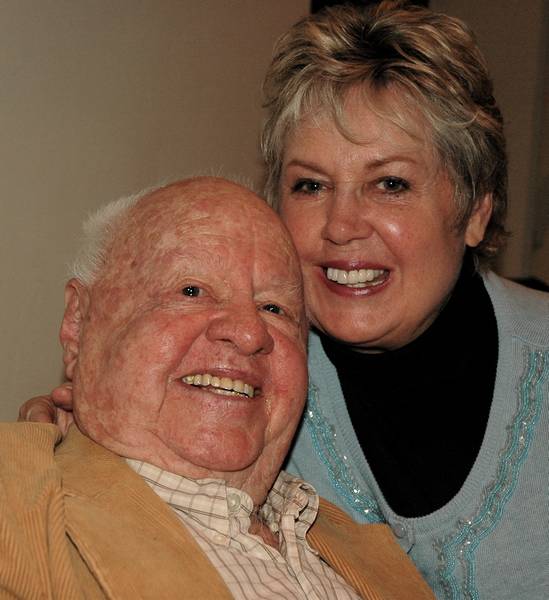TELLURIDE, Colo. – It is the longest career in the history of show businesses. Mickey Rooney first appeared on stage when he was 17 months old. He made his first movie in 1925, when he was five, and on Friday night there he was on the stage of the Sheridan Opera House at the Telluride Film Festival, telling stores, doing imitations, singing the song he wrote when Judy Garland died, and then joining his wife in a duet of “Let’s Call the Whole Thing Off.”
Rooney was awarded the Telluride Medal. After festival co-director Bill Pence hung it around his neck, I was supposed to join the Mick onstage for a Q&A, but that had to wait 10 minutes as he stepped before the footlights, rhapsodized about the golden years of Hollywood, did impressions of Clark Gable and Humphrey Bogart, and told some jokes. Standing in the wings, I realized: He’s a little taller than you think.
Earlier, we’d seen an hour of clip highlights from his career: The early Mickey McGuire comedies, which he claimed gave Walt Disney the name for Mickey Mouse. Scenes from the 22 Andy Hardy films he made at MGM (“Hey, gang! Let’s rent the old barn and put on a show!”). Dramas like “Requiem for a Heavyweight.” And a remarkable nine-minute scene with Judy Garland from “Babes on Broadway,” where he tells her about the magic of the theater and then they perform a song-and-dance routine that ends with Rooney doing “Yankee Doodle Dandy.”
“I’ll bet a lot of the audience thought you were imitating Jimmy Cagney when you did ‘Yankee Doodle Dandy’,” I told him, when the Q&As began at last. “But you made ‘Babes’ a year before he made ‘Yankee Doodle Dandy,’ so he was imitating you.”
Not at all, Rooney said. Cagney was a great actor. So were they all, everyone he worked with. Asked who his favorite co-star was, he began with Clark Gable and then simply said, “They all were.” Who was the hardest to work with? “They were all great to work with. Some not so much as others.”
Watching the session from a box by the side of the stage was Jan, Rooney’s wife of 31 years. “Everybody knows I’ve been married all those times,” he said, “but really I’ve been married only once.” He praised Jan and God for his longevity and success: “But not any particular religion. Just faith. You gotta have faith.”
Telluride makes a specialty out of surprising its audiences with unexpected treasures, and in connection with Rooney’s tribute the festival showed “The Comedian,” a 1957 live-on-TV “Playhouse 90” drama written by Rod Serling and directed by John Frankenheimer (who called Rooney “the best actor I’ve ever worked with”). The film, recently released on DVD, is a revelation for anyone who identifies Rooney with Andy Hardy.
He plays a comic with a monstrous ego, who is one of the biggest stars on TV, and one of the meanest. Mel Torme plays his brother, long the butt of the jokes in his monologues. The brother begs to be dropped from the act, but on the first show of the new season, the comic is in mid-monologue when the brother appears before the live cameras in tears and begs him to stop. Rooney plays a man for whom performing is more important than anything: He passes off his brother’s tears as a joke and then, astonishingly, throws him over his shoulder and runs offstage with him.
All of this on live TV, with no breaks, no doubles, no stunts. Just lifting him up and running off with him. “It was working without a net,” Rooney remembered. “Once the show started, you were live all the way. What went wrong, went wrong. Frankenheimer worked with six cameras, and he had his shots so carefully planned you never would have thought it was all happening in real time.”
He shared memories of working with the two great child actresses of his early years, Judy Garland and Elizabeth Taylor. Judy was a wonderful person,” he said. “She worked hard. She got tired. Doesn’t everybody have the right to get tired? She took pills, and they took hold of her. I took pills, too, but I was lucky and was able to stop them.”
When the news came of her death, he said, he wrote a song in her memory. I asked him to sing it, and he did, softly, movingly. I praised his acting, saying that early and late he seemed utterly unforced and natural; a modern unaffected actor before his time. “Everybody is an actor,” he said. “You’re acting right now, playing an interviewer.”
He’s still active. He and Jan tour in a two-person show with musical backup. “She does a great Patsy Cline.” I called her onstage, and she did some Patsy Cline, and then they did the duet: “You say tomato, I say tomato.” As an intro to the song, they argued about who was supposed to go first. “Were they acting, or really having a fight?” someone asked after the show. They were acting, but well enough that you had to wonder.











